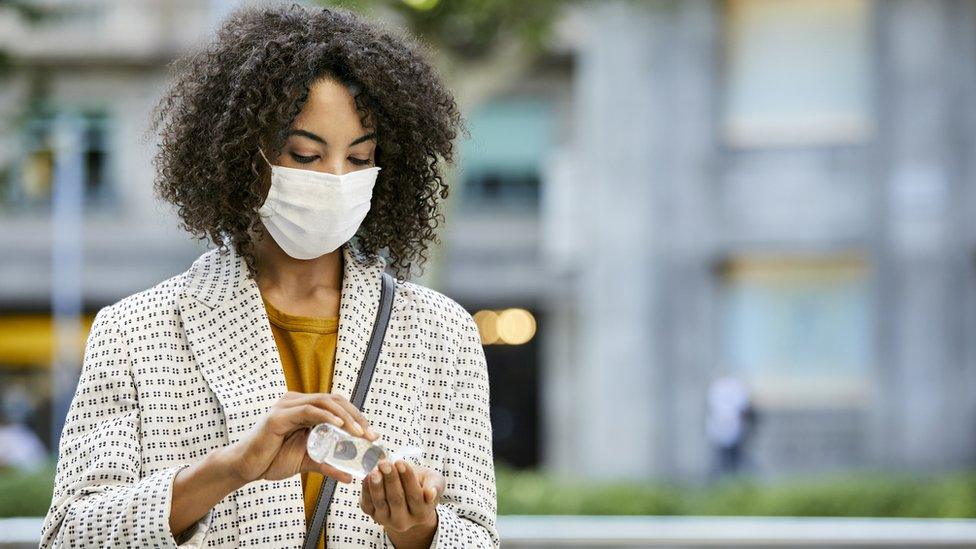Covid passes and face mask rules end in England
- Published
- comments

Face coverings and Covid passes are no longer legally required in England, after the relaxation of Plan B rules came into effect on Thursday.
Health Secretary Sajid Javid said the measures could be lifted due to the vaccine rollout's success and a better understanding of Covid treatments.
The PM's official spokesman said mask wearing would now be "a matter of personal judgment".
But some shops have said they will continue to ask people to wear them.
These include Tesco, Sainsbury's, John Lewis and Morrisons.
Rail operators also said passengers would be expected to wear face coverings. But all said they would encourage, not force, customers to comply.
London Mayor Sadiq Khan has said masks will remain mandatory on Transport for London services, calling on people to "do the right thing".
Public health guidance urging people to wear a face covering in crowded and enclosed spaces when coming into contact with strangers will remain, the government said.
Organisations will also be able to choose if they require Covid passes from those visiting their venues.
Other measures brought in to tackle the spread of the Omicron variant - including work-from-home guidance and advice on facemasks in secondary school classrooms - have already been dropped.
From Thursday, guidance on the use of face coverings in communal areas of educational settings has also been removed by the government.
The Department of Health said the changes followed a review of data last week, including infections, vaccine efficacy, Covid pressures on the NHS, workforce absences, public behaviours, and views from the scientific community.
Mr Javid said: "Our vaccines, testing and antivirals ensure we have some of the strongest defences in Europe and are allowing us to cautiously return to Plan A, restoring more freedoms to this country.
"As we learn to live with Covid, we need to be clear-eyed that this virus is not going away, so if you haven't already, please come forward for your first, second or booster jab."
Cases of coronavirus across the UK appear to be plateauing, after falling sharply from a high peak at the turn of the year.
Latest daily figures show infections remain high, with 102,292 cases reported on Wednesday.
Some 346 more people have died in the UK within 28 days of a positive test, bringing the total number of deaths by this measure to 154,702.
More than 37 million people have now had their booster or third jab - 64% of the population - with another 51,097 doses given out in the latest 24-hour period.


Meanwhile, a study in England found that two-thirds of people recently infected with the Omicron variant said they had already had Covid previously. More work is needed to know how many are true reinfections.
Elsewhere in the UK, Covid passes were scrapped for pubs, restaurants and cinemas in Northern Ireland earlier this week - although they are still required for nightclubs and large events.
Hospitality will be back to normal and nightclubs will be able to reopen in Wales on Friday 28 January, but Covid passes will still be required on entry. They will also be necessary for large events, cinemas and theatres.
In Scotland, some Covid restrictions on indoor events and venues were lifted on 24 January, including the need for table service in hospitality venues.
The ending of mandatory Covid passes in some settings in England has been welcomed by the hospitality industry.
Michael Kill, chief executive of the Night Time Industries Association, said requiring passes had been a "debilitating and divisive mitigation". Businesses across the night-time economy will celebrate the change, he said.

'THEY FEEL LIKE A SITTING DUCK': Stacey Dooley investigates stalking in the UK
THE CANDIDATES GO TEETOTAL: Which Apprentice team will perfect a new non-alcoholic drink?

Related topics
- Published27 January 2022
